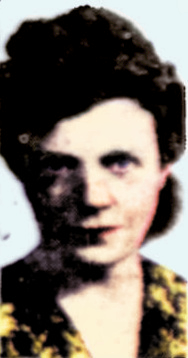The Pittsburgh Press (October 25, 1941)

I DARE SAY —
‘Another Athens–’
By Florence Fisher Parry
When the children were little, papa gave them a globe of the world. It’s a museum piece now – it belongs among the relics of a vanished day. He used to say:
You have to know geography before you understand anything that’s going on in the world. History is a blank and the future a black tunnel, if you don’t know where places are.
We used to try to trip him up on geography; yet today if he were to return he wouldn’t make much of a showing; he would find himself in a new world of fluid boundaries, and even fluid truths.
Well, I was looking at the old globe and the little spot that was Greece, and the little dot that was Crete, and I found myself minding more than anything else the tragedy that had befallen them…
And musing there an hour alone,
I dream’d that Greece might still be free;
For standing on the Persians’ grave,
I could not deem myself a slave.
A tragic figure
The other night many of us heard a plea for the starving people of Europe, a plea made by Herbert Hoover. It was memorable and loving. It seems to me that, hearing it, Mr. Hoover’s hecklers and defamers and belittlers would have felt ashamed; for here indeed was speaking a man who has met with tragic ingratitude from the very people whom he served so devoutly and honestly.
Mr. Hoover’s voice was charged with deep emotion. I doubt if ever I have heard words spoken with greater sincerity and feeling. In face of what seemed to be insurmountable odds – political antagonism and public apathy – this man has been preaching the doctrine of the golden rule in regard to the starving populations of Europe. Always a realist, and never more than now, Mr. Hoover advanced the most practical kind of plan whereby the little conquered people – and oh, especially the children – could be saved from slow death by starvation.
He sees that Hitler’s strongest weapon is the hunger he has forced upon Europe,. He knows that it can break their spirit, that it can reduce them to inert slavery, presently, and bring about the serfdom implicit in his plan.
So surely no one, however unsympathetic to Mr. Hoover’s program, can fail to render him respect for his selfless concern and his heroic effort.
One of the most shameful records in America is that which shows with what malignant efficacy the American people can destroy men in high places. Woodrow Wilson, in his last pitiful years, was destroyed by public repudiation. Herbert Hoover was likewise torn apart and made the scapegoat. Whether or not his warnings are now heeded, he has embarked upon the most merciful mission ever undertaken; the saving of human beings from death, disease and hunger.
Years hence, when the words is griped and writhing in the toils of plague and worldwide famine, the words of Herbert Hoover can well haunt the hearts of those of us still living, who will remember his warning and his prophecy, yet remained inert and apathetic, unwilling to give them even a small and isolated trial.
Too late
David Low drew a great cartoon. It appears on the cover of his book of cartoons, Low On the War. It shows the hand of God reaching through the black clouds, and in the palm of it stands a defiant little Hitler shouting:
You may have begun man, but I, Adolf Hitler, will finish him.
The sheer terror of this cartoon compares with any of Goya’s greatest sketches. Indeed, some of the cartoons of David Low which have been penned even since the publication of his war cartoons are among the greatest cartoons ever drawn. It seems to me that the cartoons of David Low and the speeches of Winston Churchill (“blood, sweat and tears”) provide the most effective of all chronicles. In sheer suspense and crescendo they have no equal.
Someday Low, or another, will make a cartoon and call it “The Glory that was Greece.” It will probably be the saddest cartoon ever made. It will show the thraldom of her people, the graveyard of her temples, the ashes of her history.
My heart leaped up when I heard the other day that some food was at last getting into Greece. We can but pray that this was so, and that the glory that was Greece will come again, and that her destiny will not be just that of “the most distinguished of all sepulchers.”
And that –
Another Athens shall arise,
And to remoter time
Bequeath, like sunset to the skies,
The splendour of its prime;
And leave, if nought so bright may live,
All earth can take or Heaven can give.
Yet it was not Herbert Hoover, nor yet Byron of Shelley, who made me think of Greece today… Our hearts are moved by humble things much oftener…
It was a little jar of honey. It had come, not long ago, from a high hill in Sparta. Happy people at peace with life and on intimate terms with beauty had taken it from a sleepy beehive, bees droning in sunny silence…
Now it had turned to sugar. It was thick and spoiled. It had been forgotten for too long.
Delay. Neglect. Forgetfulness. These vices let you die, Greece.
Now tears are not enough.